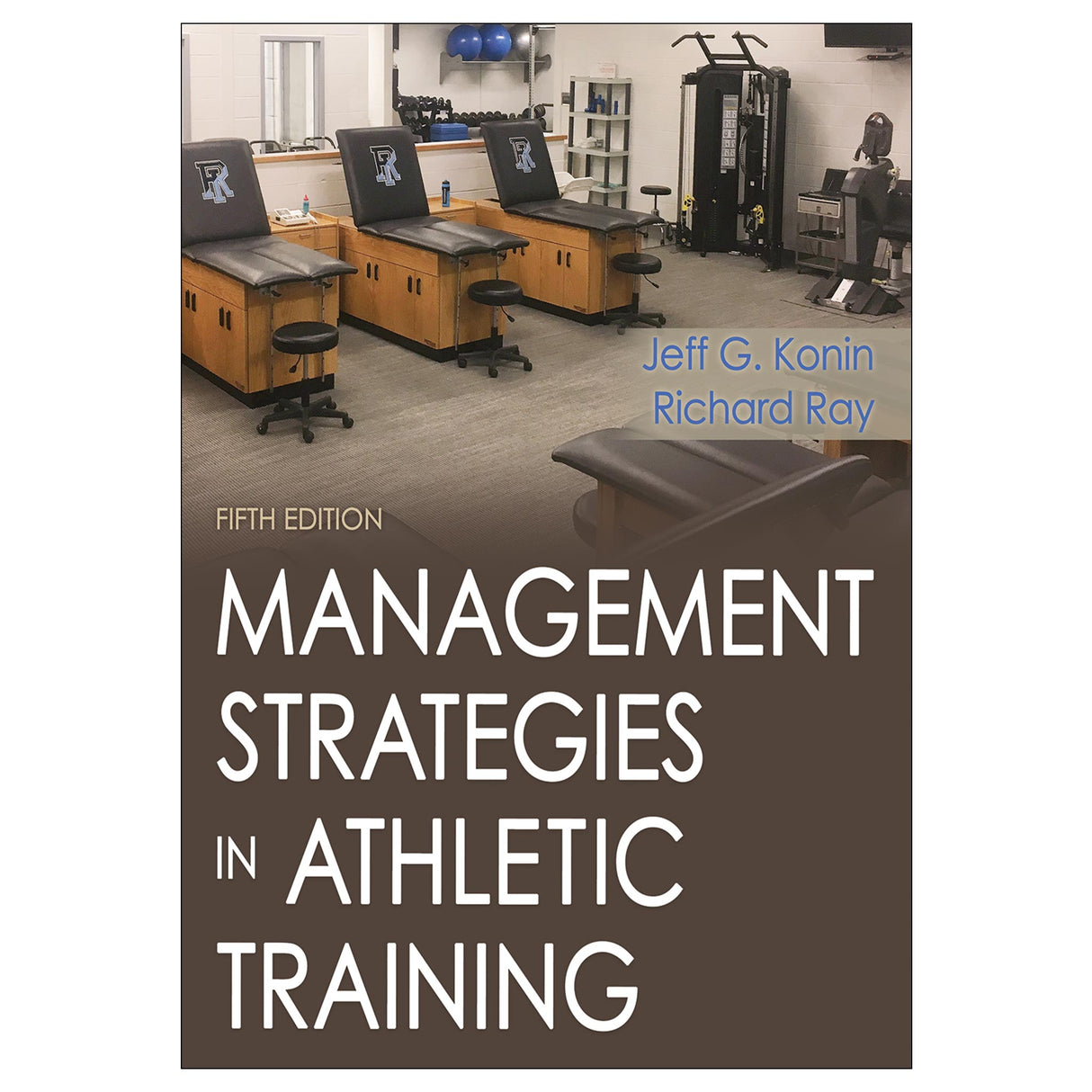Management Strategies in Athletic Training 5th Edition
Author: Jeff G. Konin, Richard Ray
$99.00 USD
Athletic trainers require more administrative knowledge than ever before, and Management Strategies in Athletic Training, Fifth Edition, is designed to help them master that knowledge.
The latest edition of this respected text prepares athletic trainers to be successful in any setting and with any clientele. It does so by presenting new material that covers trends and issues that today’s athletic trainers are facing.
New to this Edition
Management Strategies in Athletic Training, Fifth Edition, offers a great deal of new content:
• A new chapter on the profession, addressing its history, differentiation between various NATA committees, the evolution of athletic training, and more
• A new chapter on professional advocacy that explains how bills become law, the need for advocacy in the profession, the value of youth sport safety legislation, and more
• New content on documentation, injury surveillance, NATA position statements, reimbursement and salary issues, and new athletic training CPT codes
• A new appendix that lists each state’s scope of practice, board and structure, and regulations for athletic training
Management Strategies in Athletic Training, Fifth Edition, also includes thoroughly updated content in many areas:
• Preparticipation physical exam standards and drug education and testing standards
• Emergency planning
• Health care financial management
• Legal testimony and depositions
• Ethical practices in sports medicine
• Legal standards
• Employment settings
• Negotiation skills
• OSHA requirements for health care facilities
Strong Content for Many Audiences
Management Strategies in Athletic Training, Fifth Edition, is a comprehensive resource for all athletic trainers, meeting the bulk of the discipline-specific content for an entry-level athletic training curriculum. The text is suitable for entry-level students preparing for credentialing and certification, graduate students preparing for credentialing or working toward an advanced degree, athletic training residents seeking to reinforce and apply leadership techniques in their residency, and practicing athletic trainers who want to update their knowledge and skills in athletic training administration.
Equipped to Meet Today’s and Tomorrow’s Challenges
Management Strategies in Athletic Training, Fifth Edition, is the ideal text to prepare athletic trainers of the future to deal effectively with the many administrative and managerial challenges they will face in an increasingly complex and changing health care environment. Practitioners will find the book’s contemporary approach to addressing today’s management culture very refreshing.
Audience
Text for undergraduate- and graduate-level athletic training courses. Reference for athletic training residents and practitioners.
Chapter 1. The Profession of Athletic Training
Evolution of Athletic Training Education
National Athletic Trainers’ Association
Board of Certification
Appropriate Terminology
Women in Athletic Training
Ethnic Minorities in Athletic Training
Summary
Learning Aids
Chapter 2. Principles of Management
Foundations of Management
Three Management Roles
Improving Managerial Effectiveness
Summary
Learning Aids
Chapter 3. Program Management
Vision Statements
Mission Statements
Planning
Meeting and Conferences
Program Evaluation
Summary
Learning Aids
Chapter 4. Human Resource Management
Factors Related to the Sports Medicine Organization
Staff Selection
Personnel Deployment
Staff Supervision
Performance Evaluation
Fair Labor Standards Act and Athletic Training
Work–Life Balance
Summary
Learning Aids
Chapter 5. Financial Resource Management
Budgeting
Purchasing Supplies, Equipment, and Services
Inventory Management
Summary
Learning Aids
Chapter 6. Facility Design and Planning
Conceptual Development
Elements of Sports Medicine Facility Design
Summary
Learning Aids
Chapter 7. Information Management
Why Document?
Two Kinds of Information
Summary
Learning Aids
Chapter 8. Revenue for Health Care Services
Insurance Systems
Third-Party Reimbursement
Claims Processing
Purchasing Insurance Services
Revenue Models
Summary
Learning Aids
Chapter 9. Ethics in Sports Medicine
Defining Ethics
Relationship Between Legal and Ethical Considerations
The Act of Whistle-Blowing
Practicing Ethically as an Athletic Trainer
Cultural Competence
Summary
Learning Aids
Chapter 10. Legal Considerations in Sports Medicine
Legal Principles
Reducing the Risk of Legal Liability
Strategies for Dealing With Legal Challenges
Summary
Learning Aids
Chapter 11. Professional Advocacy
How Laws Are Made
Athletic Training Legislation
How to Become an Advocate for the Athletic Training Profession
Summary
Learning Aids
Chapter 12. Administration of Clinical Policies and Procedures
Development of a Clinical Policy and Procedure
Supervision
Appropriate Medical Coverage
Camp Coverage
Crisis Intervention Management
Summary
Learning Aids
Chapter 13. Preparticipation Physical Examinations
Why PPEs Are Performed
When PPEs Should Be Conducted
Where and How PPEs Should Be Conducted
What to Evaluate During the PPE
Legal Considerations
Summary
Learning Aids
Chapter 14. Drug Education and Testing
Why Drug Testing Should Be Performed
When Drug Testing Should Be Performed
How Drug Testing Should Be Performed
Pharmacological Policy
Summary
Learning Aids
Chapter 15. Emergency Action Planning
Personnel
Communication Procedures
Venue-Specific Plan
Equipment
Documentation
Special Considerations
Summary
Learning Aids
Appendix A. Health Care Professionals
Appendix B. SWOT Analysis for a Sports Medicine Program
Appendix C. NATA Code of Ethics
Appendix D. Athletic Training: State Regulation, Scope of Practice, Board and Structure, and Regulation
Practicing ethically as an athletic trainer
Work-life balance for athletic trainers
All ancillaries are free to adopting instructors through HKPropel.
Instructor guide. Contains useful instructional aids, including student activity suggestions, extra case studies, suggested readings, and a sample syllabus.Image bank. Includes most of the figures, tables, and photos from the text, sorted by chapter, to provide instructors with flexibility when creating their own customized presentations, handouts, and other course resources.
Chapter quizzes. Includes 183 questions you can use to generate tests and quizzes.





